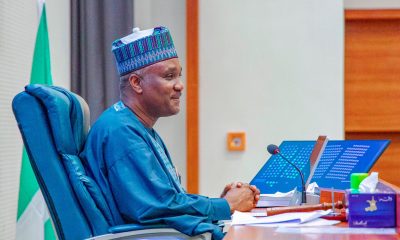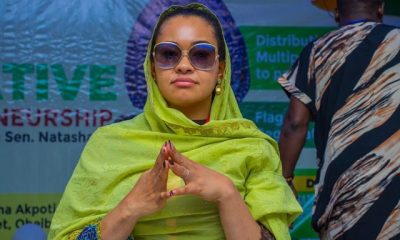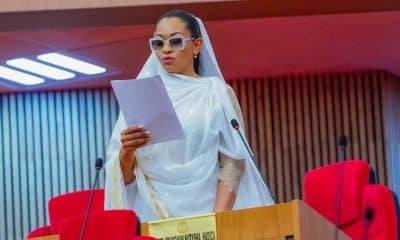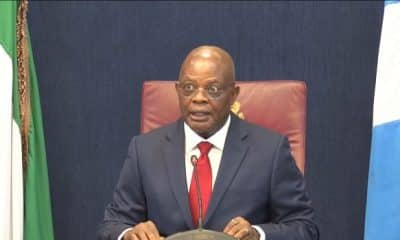Nigeria News
N-Power: Presidency Attacks Gbajabiamila, Lawan Over Claims That NSIP Has Failed

The presidency has refuted claims credited to the leadership of the 9th National Assembly that the National Social Investment Programmes (NSIPs) has failed.
The presidency also noted as false the amount claimed to have been spent on the NSIP programmes since it was set up by the administration of President Muhammadu Buhari in 2016.
The NASS leadership had noted that the National Social Investment Programmes (NSIPs) had gulped about N2trn since it was set up in 2016 but its impact on ordinary Nigerians was not felt.
Naija News reports the National Social Investments Programmes (NSIP) was set up to tackle poverty and hunger across the country. Its components are the N-Power scheme, the Conditional Cash Transfer (CCT) programme, Government Enterprise and Empowerment Programme (GEEP), and the Home Grown School Feeding Programme (HGSF).
Reacting to claims by the lawmakers, Mrs. Mariam Uwais, who was head of the NSIP between 2015 and 2019 in a statement made available to this online news platform on Wednesday, titled “Lawan, Gbajabiamila Got It Wrong”, noted that it was quite unfortunate that these false narratives were attributed to the President of the Senate, Ahmed Lawan, and the Speaker of the House of Representatives, Mr. Femi Gbajabiamila.
It accused the National Assembly leaders of attempting to discredit the good works and impacts of the NSIPs during the time it was under the supervision of the Office of the Vice President.
To clarify issues, the statement from the presidency noted that: “While the total appropriation by the National Assembly (NASS) from inception, for the four NSIPs, is N1.7 trillion, the actual funds released for the NSIPs between January 2016 and October 2019 (when the NSIPs were handed over to the Ministry of Humanitarian Affairs, Disaster Management and Social Development), amounted to N619.1 billion, constituting 36.4% of the total appropriation from the NASS.
“Also, the monies released for the N-SIPs can be further broken down into 14.03% (2016); 35% in 2017; 43.5% in 2018 and 57.8% (as at Sept 2019) of the N500B in 2016 and N400B appropriated for the subsequent years. It should be noted that for 2017 to 2020, the sum of N100B was appropriated specifically for the National Housing Fund hosted by the Federal Ministry of Finance.
“These releases covered operational activities and payments to 13,363,680 beneficiaries across all the 4 NSIPs, all of whom can all be verified either through their BVN numbers or their unique numbers generated by the National Social Register, those identities having been generated for the poorest of the poor who do not own bank accounts for sundry reasons.
“As at September 2019, the funds had expended as follows: On the: Job Creation programme (549,500 N-Power graduates and non-graduates and 7 Technology Hubs); National Home Grown School Feeding Programme (in 33 States, 9,963,762 pupils to 107,862 cooks in 54,952 primary schools); the National Cash Transfer Programme (including the development of the National Social Register by the National Social Safety Net Coordination Office) 1,491,296 poor and vulnerable households comprising 6,056,872 individuals in 33 States and 620,947 cash transfer beneficiaries; and the Government Enterprise and Empowerment Programme (managed by the Bank of Industry); a total of 2,279,380 TraderMoni, MarketMoni and FarmerMoni beneficiaries.
“In addition, it is a false to claim that poor and vulnerable beneficiaries of the NSIPs are made to apply online, through the internet and they require a BVN for payment.
“It is only in respect of the N-Power Job Creation programme that applications are made online after which successful volunteers are selected through a transparent process. Indeed, all the 774 LGAs nationwide currently have N-Power beneficiaries serving in different capacities.
“The utilization of the BVN for N-Power beneficiary payment is also as a means of identity (since the NIN number can be generated from the BVN) and to facilitate the tracking of payments and further ensure accountability.”
With regards to the National Cash Transfer Programme, the statement noted that “all the cash transfer beneficiaries are derived from a National Social Register (NSR), comprising State Social Registers that are developed and hosted by the State Ministries of Panning of each State.
“The process for objective identification of poor and vulnerable households is as provided in the Financing Agreement (F.A) signed between Nigeria and the World Bank, for which purpose the World Bank IDA Credit and the recovered funds from the Abacha family are being utilised.”
The Presidency’s statement added that, “The process involves a poverty mapping of the LGAs in each State, community mobilization, targeting and identification supported by trained enumerators at State and LGA levels, after which each of the households identified by the communities is visited and data collated.
“As at March 31st 2020, the NSR comprised 11,045,537 individuals from 2,644,495 households, collated from 35 States, 453 LGAs, 47,698 communities. The identity of beneficiaries can be verified as each has a generated unique number and can be tracked.
“For the records, although the National Social Investment Office (NSIO) was then under the Office of the Vice President; the accounting and procurement aspects of the NSIPs were handled by the Ministry of Budget and National Planning on behalf of the NSIO, and not the Office of the VP. As such, all requests for information related thereto were responded to by that Ministry.
“It should also be noted that during the period that the NSIO supervised the NSIPs under the auspices of the Office of the Vice President, documents relating to the structure, activities and progress of the NSIPs were routinely shared with the National Assembly.”












